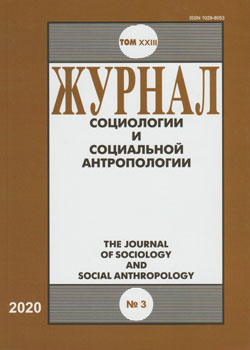Репетиторство в России: нельзя увидеть, но можно услышать
Аннотация
Литература
Bray M. (2011) The challenge of shadow education: private tutoring and its implications for policy makers in the European Union. Brussels: European Commission.
Byun S., Baker D. (2015) Shadow education. In: Scott R.A., Kosslyn S.M. (eds.) Emerging Trends in the Social and Behavioral Sciences. Hoboken, NJ, USA: John Wiley & Sons: 1–9.
Balakina T. (2011) Ekonomika repetitorstva: motivy, stimuly, modeli [Economy of private tutoring: motives and models]. Finansy i biznes [Finance and Business], 2: 4–15 (in Russian).
Barsukova S. (2003) Formal'noe i neformal'noe trudoustrojstvo: paradoksal'noe skhodstvo na fone ochevidnogo razlichiya [Formal and informal labour: paradox and similarity at the same time]. Sotsiologicheskie issledovaniya [Sociological Studies], 7: 3–16 (In Russian).
Barsukova S. (2003) Esse o neformal'noj ekonomike, ili 16 ottenkov serogo [Essay on informal economy: 16 shades of grey]. Moscow: Vysshaya shkola ekonomiki (in Russian).
Biswal P. (1999) Private tutoring and public corruption: a cost-effective education system for developing countries. The Developing Economies, 37(2): 222–240.
Bray M. (2013) Shadow education: comparative perspectives on the expansion and implications of private supplementary tutoring. Procedia — Social and Behavioral Sciences, 77: 412–420.
Bray M., Kwok P. (2003) Demand for private supplementary tutoring: conceptual considerations, and socio-economic patterns in Hong Kong. Economics of Education Review, 22(6): 611–620.
Cohen P., Kulik J., Kulik C. (1982) Educational outcomes of tutoring: A meta-analysis of findings. American Educational Research Journal, 19(2): 237–248.
Damm I.A. (2018) Korrupcionnoe repetitorstvo i ego preduprezhdenie [Corruption tutoring and its prevention]. Administrativnoe pravo i praktika administrirovaniya [Administrative Law and Administration Practice], 1: 24–32.
Das G., Das R. (2013) An empirical view on private tutoring in school mathematics of Kamrup District. International Journal of Scientific and Research Publications, 3(5): 1–8.
Foondun R. (2002) The issue of private tuition: an analysis of the practice in Mauritius and selected South-East Asian Countries. International Review of Education, 48(6): 485–515.
Glewwe P., Hanushek A., Humpage S., Ravina R. (2011) School resources and educational outcomes in developing countries: A Review of the literature from 1990 to 2010. NBER Working Paper No. 17554: 13–64.
Huang M. (2013) After-school tutoring and the distribution of student performance. Comparative Education Review, 57(4): 689–710.
Ireson J. (2004) Private tutoring: how prevalent and effective is it? London Review of Education, 2(2): 109–22.
James E. (1987) The public/private division of responsibility for education: An international comparison. Economics of Education Review, 6(1): 1–14.
Kim S., Lee J. (2010) Private Tutoring and Demand for Education in South Korea. Economic Development and Cultural Change, 58(2): 259–296.
Kozar O. (2013) The face of private tutoring in Russia: evidence from online marketing by private tutors. Research in Comparative and International Education, 8(1): 74–86.
Kuan P. (2011) Effects of Cram Schooling on Mathematics Performance: Evidence from High Students in Taiwan. Comparative Education Review, 55(3): 342–368.
Loyalka P., Zakharov A. (2016) Does shadow education help students prepare for college? Evidence from Russia. International Journal of Educational Development, 49(7): 22–30.
Makeev P. (2018) Samozanyatost' v Rossii: teoreticheskoye opredelniye, prakticheskoye izmereniye i zakonodatel'noye regulirovaniye [Self-Employment in Russia: Theoretical Definition, Measurement and Legislative Regulation]. EKO, 11: 148–157 (in Russian).
Мakeev P.A. (2019) Repetitorstvo v Rossii: opisaniye yalveniya na osnove onlayn-platform [Private tutoring in Russia: description of the phenomenon based on online platforms]. Zhurnal institutsional'nykh issledovaniy [Journal of institutional studies], 11: 106–120 (in Russian).
Matyushkina M. (2019) Effektivnost' shkoly i eyo kriterii v sovremennyh usloviyah rasprostraneniya repetitorstva i dostupnosti interneta [School efficiency and its criteria in the era of internet]. Nepreryvnoe obrazovanie: 21 vek [Constant education: 21 century], 1(25): 53–64 (in Russian)
Mischo C., Haag L. (2002) Expansion and effectiveness of private tutoring. European journal of psychology of education, 17(3): 263–273
Naumova A. (2017) Rol' repetitorstva v sovremennoj sisteme obrazovaniya [Role of private tutoring in the modern educational system]. Rossiya mezhdu modernizaciej i arhaizaciej: 1917–2017: materialy XX Vserossiyskoy nauchno-prakticheskoy konferentsii: v 2-kh tomakh [Russia between modernization and archaization: 1917–2017: materials of the XX All-Russian scientific and practical conference: in 2 volumes]. Surgut: «Gumanitarnyy universitet» (in Russian).
Rosenshine B., Furst N. (1969) The Effects of Tutoring upon Pupil Achievement: Research Review. Eric, 1–43.
Shchelkova S.D. (2015) Rol' sovremennyh roditelej v razvitii repetitorstva v mladshej shkole [Parents’ role in development of the private tutoring in elementary school]. Na putyah k novoj shkole [To the new school], 1: 48–50 (in Russian).
Shipkova E.N. (2018) Repetitorstvo kak vybor sovremennyh roditelej [Private tutoring as a parents’ choice]. Aktual'nye voprosy nauki [Contemporary issues of science], 40: 195–198 (in Russian).
Smyth E., (2009) Buying your way into college? Private tuition and the transition to higher education in Ireland. Oxford review of education, 35(1): 1–22.
??astn? V. (2017) Private tutoring lessons supply: insights from online advertising in the Czech Republic. Compare: A Journal of Comparative and International Education, 47(4): 561–579.
Tansel A., Bircan F. (2006) Demand for education in Turkey: A tobit analysis of private tutoring expenditures. Economics of Education Review, Special Issue: In Honor of W. Pierce Liles, 25 (3): 303–313.
Tsiplakides I. (2018) Shadow education and social class inequalities in secondary education in Greece: The case of teaching English as a foreign language. International Journal of Sociology of Education, 7 (1): 1–71.
Wasik B., Slavin R. (1993) Preventing early reading failure with one-to-one tutoring: a review of five programs. Reading Research Quarterly, 28(2): 178–200.
Watson L. (2008) Private expectations and public schooling: the growth of private tutoring in Australia. (AARE) National Conference, 11: 1–15.
Yu Zh. (2013). Does private tutoring improve students National College Entrance exam performance? — A case study from Jinan, China. Economics of Education Review, 32: 1–28.
Zhulyabina N.M. (2017) Fenomen elektronnogo repetitorstva: novyj shag k sokrashcheniyu neravenstva v obrazovanii? [Phenomenon of online private tutoring: new step in education?]. Pisma v Emissiya.Offlayn [The Emissia.Offline Letters], 6: 25 (in Russian).






